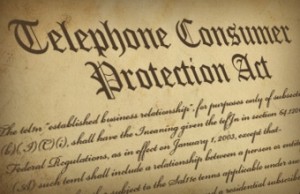 In a precedential opinion, the United States Court of Appeals for the Third Circuit held that a non-intended recipient of an automated telephone solicitation has legal standing to sue Bank of America for violating the Telephone Consumer Protection Act, 42 U.S.C. § 277. Leyse v. Bank of America, N.A., Case No. 14-4073 (3rd Cir., October 14, 2015).
In a precedential opinion, the United States Court of Appeals for the Third Circuit held that a non-intended recipient of an automated telephone solicitation has legal standing to sue Bank of America for violating the Telephone Consumer Protection Act, 42 U.S.C. § 277. Leyse v. Bank of America, N.A., Case No. 14-4073 (3rd Cir., October 14, 2015).
In this particular case, a telemarketer promoting Bank of America credit cards placed a robocall to a landline shared by the plaintiff Leyse and his roommate, Genevieve Dutriax. The phone line was registered in Dutriax’s name, and she was the intended recipient of the call. The call consisted of a robocall in violation of the Telephone Consumer Protection Act provision prohibiting the use of a prerecorded voice to deliver a message to a residential telephone line without the subscriber’s consent, unless the call was for emergency purposes.
Although only one of the roommates answered the call, both of them filed several class action lawsuits against Bank of America. At the District Court level Bank of America successfully argued that Leyse could not maintain a claim under the Telephone Consumer Protection Act because he was not the intended recipient of the call. A person aggrieved under the Telephone Consumer Protection Act can sue for actual damages or statutory damages of $500 per each violation. Because Leyse was not the “called party,” the United States District Court for the District of New Jersey held that he could not sue Bank of America under the Telephone Consumer Protection Act. The District Court determined that the term “called party” refers to the intended recipient of the robocall, rather than the actual recipient. Because Leyse was not the intended recipient, the trial court held he lacked legal standing to sue.
In reversing the District Court’s ruling, the Third Circuit Court of Appeals relied on the legislative history of the Consumer Telephone Protection Act citing Congress’s outrage over the proliferation of prerecorded telephone calls to private residences, which consumers viewed as an invasion of privacy and a nuisance. Finding that Leyse was in the Telephone Consumer Protection Act’s “zone of interests,” the federal appeals court held he has standing to sue Bank of America under the Act.
Congress’s repeated references to privacy convince us that a mere houseguest or visitor who picks up the phone would likely fall outside the protected zone of interests. On the other hand, a regular user of the phone line who occupies the residence being called undoubtedly has the sort of interest in privacy, peace, and quiet that Congress intended to protect.
Kudos to the Third Circuit. It’s well reasoned decision applies a common sense approach to a persistent problem with annoying telemarketer robocalls, making us wonder how the District Court got it wrong in the first place.